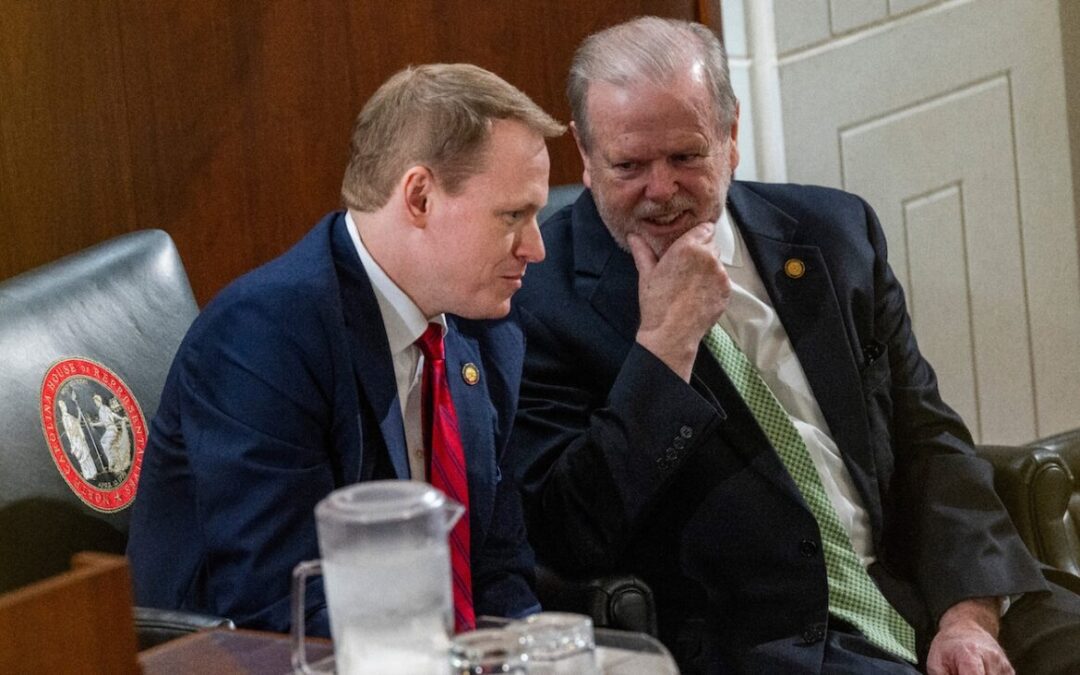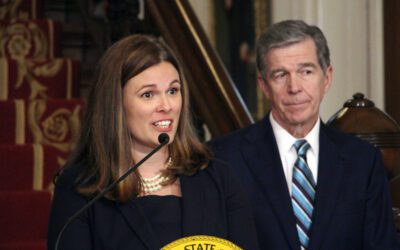
NC Gov. Josh Stein during an appearance on The Late Show with Stephen Colbert and guest in June. (Photo by Scott Kowalchyk/CBS via Getty Images)
Since Democrats broke the supermajority in the NC House, these overrides are no sure thing, but some of the bills got bipartisan support.
The North Carolina General Assembly is pausing its summer break this week to try to override Gov. Josh Stein’s vetoes of bills that would allow 18 year olds to carry concealed weapons, eradicate diversity efforts in schools and state government, and blow up the state’s ambitious goals to fight climate change.
Since Democrats broke the Republican supermajority in the North Carolina House last November by a single seat, those override votes are no longer a sure thing. But some of the bills Stein vetoed got some bipartisan support, and Republicans need only one House Democrat to break ranks—or even just miss the vote—in order to be successful. Republicans maintained their supermajority in the state Senate and are all but certain to override each veto in that chamber.
It is unclear if NC House Speaker Destin Hall (R-Caldwell, Watauga counties) will bring an override vote to the House floor if he knows it is going to fail, so it’s possible not all of the 14 bills Stein vetoed will make it there. Republican leaders also have lots of leeway to reschedule the votes if they think their chances are better down the road.
But strap in: Tuesday could be a busy day.
Here is a quick look at some of the bills the legislature will try and pass by overriding Stein.
Senate Bill 50: Allowing 18- year olds to carry concealed weapons in public
SB50 lowers the concealed carry age restriction from 21 to 18, and would end current license and training requirements. It passed in the House with no Democratic support, but even some Republicans voted against it.
If the override is successful, it would be perfectly legal for an 18 year old who’s never held a gun in his life to stick that gun in his waistband and go to the club.
In his veto, Stein said the bill “makes North Carolinians less safe and undermines responsible gun ownership.”
Republican State Reps. Ted Davis (New Hanover Co) and William Brisson (Bladen, Sampson Counties) voted against the bill, and no Democrats voted for it. If they all stick to their votes, Republicans won’t be able to override the veto, but if enough Democrats miss the override in the House, Republicans can still make the math work.
Immigration bills
Stein vetoed two bills that compel state cooperation with ICE, but they could face different fates.
SB 153 would require the state’s Public Safety and Adult Correction departments as well as the State Highway Patrol and the State Bureau of Investigation to join a federal program that trains state personnel to conduct immigration raids.
All House Democrats who were present voted against it, leaving Republicans to rely on the possibility of Democratic absences to override it.
Stein said he vetoed the bill because it would further strain already-stretched law enforcement officers.
“This bill takes state law enforcement officers away from their existing state duties and forces them to act as federal immigration agents,” Stein wrote.
A separate bill passed the same day, HB318, would require North Carolina sheriff departments to notify ICE about any people they detain who have federal immigration detention waivers filed against them, and then to hold those individuals until ICE comes to get them.
Stein said in his veto statement that he supports the parts of the bill that require sheriffs to contact ICE about detainees charged with violent crimes, but could not sign it because “it is unconstitutional.”
That bill, Stein said, would require sheriffs to hold individuals longer than temporary detention protections allow.
“My oath of office requires that I uphold the Constitution of the United States,” he wrote.
“The Fourth Circuit is clear that local law enforcement officers cannot keep people in custody solely based on a suspected immigration violation.”
Democratic State Rep. Carla Cunningham of Charlotte voted for HB 318, so if she votes the same way on the override vote, Republicans likely have the votes to pass the bill.
DEI bills
Republicans in the General Assembly got the memo from the Trump administration. They followed Trump’s lead in casting diversity, equity and inclusion (DEI) as evil concepts.
The legislature passed three separate bills barring state agencies (HB171), public schools (SB227) and universities and colleges (SB558) from intentionally diversifying their institutions, or making them more inclusive and equitable.
In short, these bills make it illegal to confront systemic racism or even acknowledge it.
SB227, for example, prevents K-12 schools from teaching “divisive concepts,” which the bill defines in part as teaching that “An individual, solely by virtue of his or her race or sex, is inherently racist, sexist, or oppressive.”
To be clear, lesson plans teaching that race alone makes someone racist are just not a thing.
But teachers worry this language will block them from accurately teaching about the civil rights movement and other times in the country’s history where racism was an undeniable fixture in state and local governments.
In his veto of SB558, Stein said the bill would “whitewash history … police dorm rooms … and ban books.”
All three bills, he said in a separate statement, were “mean spirited” distractions.
“At a time when teachers, law enforcement, and state employees need pay raises and people need shorter lines at the DMV, the legislature failed to pass a budget and, instead, wants to distract us by stoking culture wars that further divide us,” Stein wrote. “These mean-spirited bills would marginalize vulnerable people and also undermine the quality of public services and public education.”
The preamble of each of the bills say it is necessary to kill DEI in order to promote the “equality and rights of all persons.”
The equality and rights of all persons, of course, is what diversity, equity and inclusion actually mean.
No House Democrats voted for any of the DEI bills.
Undoing a key law to fight climate change
SB266 will essentially repeal a bipartisan law passed in 2024 that gave Duke Energy until 2030 to cut its greenhouse gas emissions by 70%. Greenhouse gases are the biggest driver of human-caused climate change and Duke is one of the country’s leading emitters of greenhouse gases.
Republicans praised the bill as a means to immediately lower energy costs for consumers, but studies show that the bill will result in far higher long-term costs to the energy grid, the state economy, and the country’s climate change fight.
The 2030 emissions deadline helped spur huge investments in clean energy in North Carolina, establishing the state as a leader in solar and wind projects. This bill will pop that balloon, opponents say.
According to the BW Partnership group, a national market research firm, the bill will cost the state 50,700 jobs annually starting in 2030, lower revenue by over $1.4 billion, and result in $47.2 billion less in “power sector investments.”
It will also leave North Carolina with a weaker power grid, the study says.
SB266 “hampers the state’s ability to meet current energy needs and undermines its competitive edge in attracting energy-intensive industries,” the study says.
The bill passed the Senate with four Democratic votes and passed the House with the support of 11 Democrats, so unless all of the House Democrats have a change of heart, the legislature will have the votes to override Stein’s veto.
Support Our Cause
Thank you for taking the time to read our work. Before you go, we hope you'll consider supporting our values-driven journalism, which has always strived to make clear what's really at stake for North Carolinians and our future.
Since day one, our goal here at Cardinal & Pine has always been to empower people across the state with fact-based news and information. We believe that when people are armed with knowledge about what's happening in their local, state, and federal governments—including who is working on their behalf and who is actively trying to block efforts aimed at improving the daily lives of North Carolina families—they will be inspired to become civically engaged.


Opinion: If NC Democrats want impact, they need to be more competitive in state legislative elections
There are at least 15 state House and Senate races that were decided by less than a 5% margin in the last election. That’s where NC Democrats need...

How NC Republicans turned a bill with unanimous support into anti-LGBTQ legislation
Republicans in the NC House last week passed HB850 over Gov. Josh Stein’s veto by just one vote, despite it passing 113-0 in the spring. Why the...

North Carolina lawmakers approve temporary spending measure as budget impasse lingers
North Carolina is one of a few states that have not yet enacted a budget this fiscal year. North Carolina legislators gave final approval Wednesday...

North Carolina lawmakers approve temporary spending measure as budget impasse lingers
North Carolina is one of a few states that have not yet enacted a budget this fiscal year. North Carolina legislators gave final approval Wednesday...

NC lawmakers override Josh Stein’s vetoes on climate change, gun laws
With some Democratic support, legislators defied Gov. Josh Stein, weakened state climate change laws and made it legal for private school teachers...








